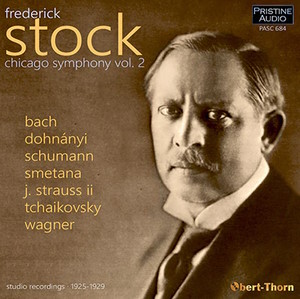
Frederick Stock (conductor)
Chicago Symphony Volume 2
rec. 1925-28, Webster Hotel Ballroom, Orchestra Hall, Goodman Theatre, Chicago
Pristine Audio PASC684 [76 + 77]
The first volume in this series reinforced Frederick Stock’s interpretative qualities and the generally high standards cultivated by his orchestra, the Chicago Symphony, in its early days. Stock was born in 1872 so the series also continues to celebrate his 150th anniversary. Transfer engineer Mark Obert-Thorn has also returned to some of his previous work on the Biddulph label for whom back in 1994 he produced a twofer that also includes two major works heard in this release, the Tchaikovsky Fifth Symphony and Dohnányi’s early and genially Brahmsian Suite in F sharp minor.
Before that we can consider his Bach Suite No.2 with flautist Ernest Liegl, recorded in 1928. Stock had been beaten in the honour of first recording of the work by Hamilton Harty, with Robert Murchie. Stock is rather swifter – except in the Ouverture where he is also textually fuller than Harty. Tempo-wise the only movement they agree on – largely because of the cuts imposed on one or other by their recording companies – is the Badinerie, where they take exactly the same tempo. Both offer exciting readings. With a buoyant Bach under Stock’s belt we move on to two recordings of Suk’s Intermezzo, the second of his Fairy Tales. Stock recorded this exactly a year apart. The 1925 recording was on a 10” disc, with a small ensemble drawn from the orchestra and recorded in a small hall. Both Victor and the conductor must have, as it were, taken stock of things as this recording wasn’t issued and is making its first appearance here. They remade it in 1926 on a 12” disc and there is far greater amplitude and depth in this remake, with a larger contingent in Orchestra Hall – which has a real sense of space. There’s only a six-second difference between the two recordings,r despite the larger disc.
The first disc also includes Dvořák’s Slavonic Dance No.8, recorded on the same day in 1926, and which also benefits from the gain in orchestral sonority, and a 1928 reading of the overture to Russlan and Ludmilla – controlled but strongly conceived. However, the main work is Tchaikovsky’s Fifth Symphony (December 1927). As I wrote when it appeared on Biddulph back in a 2003 review; ‘This is a subjectivist approach, in line with prevailing orthodoxies, or some prevailing orthodoxies at any rate. There are a lot of rhetorical pauses and emotive underlinings but the linearity of the music making is not compromised and it emerges as a commanding and sympathetic reading.’ This is a reference to Stock’s startlingly idiosyncratic first movement Luftpause. There are also snips in the finale, as was commonplace then on disc. Obert-Thorn has clearly had access to the Biddulph master tapes or has acquired a new set of discs or has employed superior methods (over the intervening years) of cleaning up the discs as the pops and ticks that were audible on the Biddulph have been profitably cleansed in this new restoration. Play a game of compare-and-contrast with Alexander Kitschin’s 1928-29 Berlin recording of the symphony which has been transferred on Pristine Audio PASC268.
Dohnányi’s Suite in F sharp minor was also on Biddulph and also sounds better here too in this wittily argued performance. There are four small pieces by Glazunov, Wagner, Johann Strauss and Smetana to swell the disc – the Glazunov is the Pas d’action from Scènes de ballet and is surprisingly charming and the Wagner is Theodore Thomas’ arrangement of Träume from the Wesendonck Lieder. However, the main interest is Schumann’s Symphony No.1 (December 1929) which has already made a CD appearance when it was transferred sharp on RCA. Obert-Thorn has corrected the speed so that it emerges at a somewhat more solid tempo but also as a performance of vigour and balance, with buoyant, exciting playing that reinforces the fact (as if it needs repeating), that Chicago had a first-rate orchestra long before certain post-War Hungarian martinet conductors directed it.
This volume reprises the virtues of the inaugural twofer and the good news is that we can look forward to more Stock from this source.
Jonathan Woolf
Previous review: Gregor Tassie (May 2023)
Availability: Pristine Classical
Contents
CD 1
Johann Sebastian Bach (1685-1750)
Suite No. 2 in B minor, BWV 1067 (1738-39)
Ernest Liegl (flute)
Josef Suk (1874-1935)
Intermezzo: Playing at Swans and Peacocks: No. 2 from Fairy Tale Suite, Op. 16 (1897-1900) 1st recording and 2nd recording
Antonín Dvořák (1841-1904)
Slavonic Dance No. 8 in G minor, Op. 46 (1878)
Pyotr Ilyich Tchaikovsky (1840-1893)
Symphony No.5 in E minor (1888)
Mikhail Glinka (1804-1857)
Russlan and Ludmilla – Overture (1842)
CD 2
Ernő Dohnányi (1877-1960)
Suite in F-sharp minor, Op. 19 (1909)
Alexander Glazunov (1865-1936)
Pas d’action from Scènes de ballet, Op. 52 (1894)
Richard Wagner (1813-1883)
Träume – No. 5 Wesendonck from Lieder (1857-58) arr. Theodore Thomas
Johann Strauss II (1825-1899)
Du und du (Waltzes from Die Fledermaus) (1874)
Bedřich Smetana (1824-1884)
The Bartered Bride – Overture (1866)
Robert Schumann (1810-1856)
Symphony No. 1 in B-flat major, Op. 38, “Spring” (1841)


















